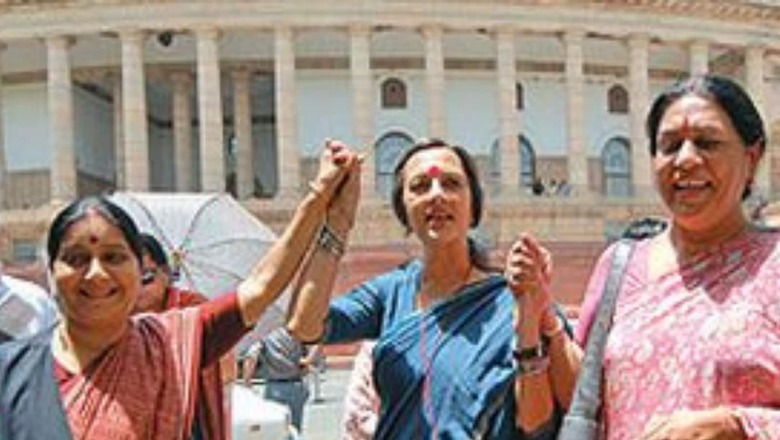
views
25 years since it was first introduced in Parliament, the Women’s Reservation Bill is yet to become a reality. First introduced in 1996, the bill had to go through several rounds in Parliament only to be rejected each and every time.
In 2008, late law minister HR Bhardwaj was set to introduce the ‘new and improved Women’s Reservation Bill in the Rajya Sabha. The Bill sought 33% reservation for women in Parliament and state legislative assemblies, and promised a quota for scheduled castes and scheduled tribes within the ambit of the legislation.
But before it could even be heard and discussed, bedlam in the upper house of parliament obstructed the bill’s passage with many Samajwadi Party members attempting to snatch and shred the Bill. The bill was however protected from being torn to bits by a ring formed by the women present at the parliament including Renuka Chowdhury, Jayanti Natarajan, and Alka Balram Kshatriya. The Bill was inevitably sent to the standing committee for review after which it was reintroduced and passed by the Upper House in 2010. However, it soon lapsed with the 15th Lok Sabha.
The was the fourth time the Bill was introduced in Parliament and failed to go through. It was opposed on multiple grounds with some accusing it to propagate a ‘proxy culture’ or ‘sarpanch pati’. For those backing the bill, however, it stands as a means to empower women who continue to remain marginalized in the political discourse.
The bill, experts argue holds vital importance in a country like India that envisions a new egalitarian society that envisages equal rights for men and women especially in a scenario where there has been a marginal rise in the number of women parliamentarians.
Tracing back to its origin, the idea for the Bill originated from a constitutional amendment in 1993 that stated that one-third of sarpanch (or council leader) positions in the gram panchayat should be reserved for women
The Bill was opposed on numerous occasions with critics arguing it would underline the lack of women’s merit as they would enter on the basis of reservation.
“Opponents argue that it would perpetuate the unequal status of women since they would not be perceived to be competing on merit. They also contend that this policy diverts attention from the larger issues of electoral reform such as the criminalization of politics and inner-party democracy,” PRS Legislative Research stated in a research paper, reported Hindustan Times.
Some women parliamentarians like TMC’S Sushmita Dev stressed the need to implement political reforms along with the bill. While BJP leaders contended that the need for women’s reservation was unnecessary if one ‘follows the ruling party model’ which rewards people on merit, irrespective of whether it is men or women.
According to PRS Legislative Research at present, there are 78 women MPs in Lok Sabha. This is the highest number in the history of the House. The first LS only had 24 women members.
Read all minute-by-minute news updates for Uttar Pradesh election results 2022, Punjab election results 2022, Uttarakhand election results 2022, Manipur election results 2022, and Goa election results 2022.
Click here for seat-wise LIVE result updates.



















Comments
0 comment